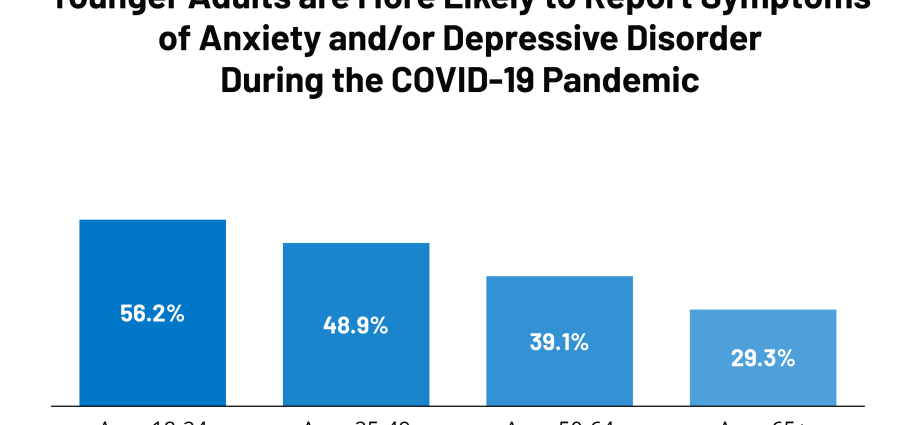Werrej
F'konformità mal-missjoni tiegħu, il-Bord Editorjali ta 'MedTvoiLokony jagħmel kull sforz biex jipprovdi kontenut mediku affidabbli appoġġjat mill-aħħar għarfien xjentifiku. Il-marka addizzjonali "Kontenut Iċċekkjat" tindika li l-artiklu ġie rivedut minn jew miktub direttament minn tabib. Din il-verifika f'żewġ passi: ġurnalist mediku u tabib jippermettulna nipprovdu l-ogħla kontenut ta 'kwalità f'konformità mal-għarfien mediku attwali.
L-impenn tagħna f’dan il-qasam ġie apprezzat, fost l-oħrajn, mill-Assoċjazzjoni tal-Ġurnalisti għas-Saħħa, li tat lill-Bord Editorjali ta’ MedTvoiLokony it-titlu onorarju ta’ Edukatur il-Kbir.
Scientists are still discovering the long-term effects of COVID-19. More and more information concerns the work of the brain and nervous system. According to psychiatrists, people who have contracted COVID-19 are more likely to develop mental disorders. These are disturbing reports.
- More and more studies show that COVID-19 affects the work of the brain and may increase the risk of mental disorders in people who have contracted the infection
- 1 in 5 people after contracting COVID-19 have developed disorders such as anxiety, depression or insomnia
- Aktar informazzjoni aġġornata fuq il-paġna ewlenija ta' TvoiLokony
Mental disorders in patients after COVID-19
The SARS-CoV-2 coronavirus not only affects the respiratory tract, but also affects other organs in our body. More and more studies show that it can affect the work of our brain. Scientists studied people who contracted COVID-19 and found that some of them had mental health problems. The most frequently mentioned were anxiety, depression and insomnia. The researchers also found that these patients were also more likely to develop dementia.
Ara wkoll: COVID-19 Jaċċellera t-Tixjiħ tal-Moħħ?
“People are concerned that people who have had COVID-19 will be at greater risk of mental health problems, and our findings … show that it is likely,” said Paul Harrison, professor of psychiatry at the University of Oxford.
According to the psychiatrist, health services must be ready to provide care to COVID-19 patients who develop mental health problems, especially as the results of the study may be underestimated.
Int infettat bil-koronavirus jew xi ħadd qrib tiegħek għandu COVID-19? Jew forsi taħdem fis-servizz tas-saħħa? Tixtieq taqsam l-istorja tiegħek jew tirrapporta xi irregolaritajiet li int rat jew affettwajt? Iktbilna fuq: [Email protetti]. Aħna niggarantixxu l-anonimità!
Anxiety, depression and insomnia after developing COVID-19
Scientists analyzed the health cards of 69 million people in the United States, including more than 62. with confirmed COVID-19. Within three months of testing positive for COVID-19, 1 in 5 survivors are first diagnosed with disorders such as anxiety, depression or insomnia. The study was published in the journal “The Lancet Psychiatry”.
Interestingly, researchers also found that people diagnosed with mental disorders are 65 percent. more likely to be infected with SARS-CoV-2 coronavirus than people without the disorder.
Mental health experts who were not involved in the study said these findings are yet another confirmation that COVID-19 affects the work of the brain and may contribute to an increased risk of a number of mental disorders.
“This is likely due to a combination of the psychological stressors associated with this particular pandemic and the physical effects of the disease,” said Michael Bloomfield, consultant psychiatrist at University College London.
Simon Wessely, professor of psychiatry at King’s College London, said the finding that people with mental health disorders are more susceptible to contracting SARS-CoV-2 coronavirus supports what previous research has shown.
«COVID-19 affects the central nervous system, so it can exacerbate further disorders. Research confirms that this is not all, and that the risk is increased by previous poor health, »added Wessely.
Il-bord editorjali jirrakkomanda:
- Ġie identifikat sintomu ġdid bikri tal-COVID-19. Jista 'jkun inkwetanti
- Ix-xjentisti eżaminaw il-pulmuni ta 'dawk li mietu minn COVID-19. Kif irriżulta?
- Varjanti minuri tal-ġeni jistgħu jaffettwaw is-severità tal-COVID-19
Il-kontenut tal-websajt medTvoiLokony huwa maħsub biex itejjeb, mhux jissostitwixxi, il-kuntatt bejn l-Utent tal-Websajt u t-tabib tagħhom. Il-websajt hija maħsuba għal skopijiet informattivi u edukattivi biss. Qabel ma ssegwi l-għarfien speċjalizzat, b'mod partikolari parir mediku, li jinsab fuq il-Websajt tagħna, trid tikkonsulta tabib. L-Amministratur ma jġorr l-ebda konsegwenzi li jirriżultaw mill-użu tal-informazzjoni li tinsab fuq il-Websajt. Għandek bżonn konsultazzjoni medika jew riċetta elettronika? Mur fuq halodoctor.pl, fejn ikollok għajnuna onlajn - malajr, b'mod sigur u mingħajr ma titlaq mid-dar tiegħek.










